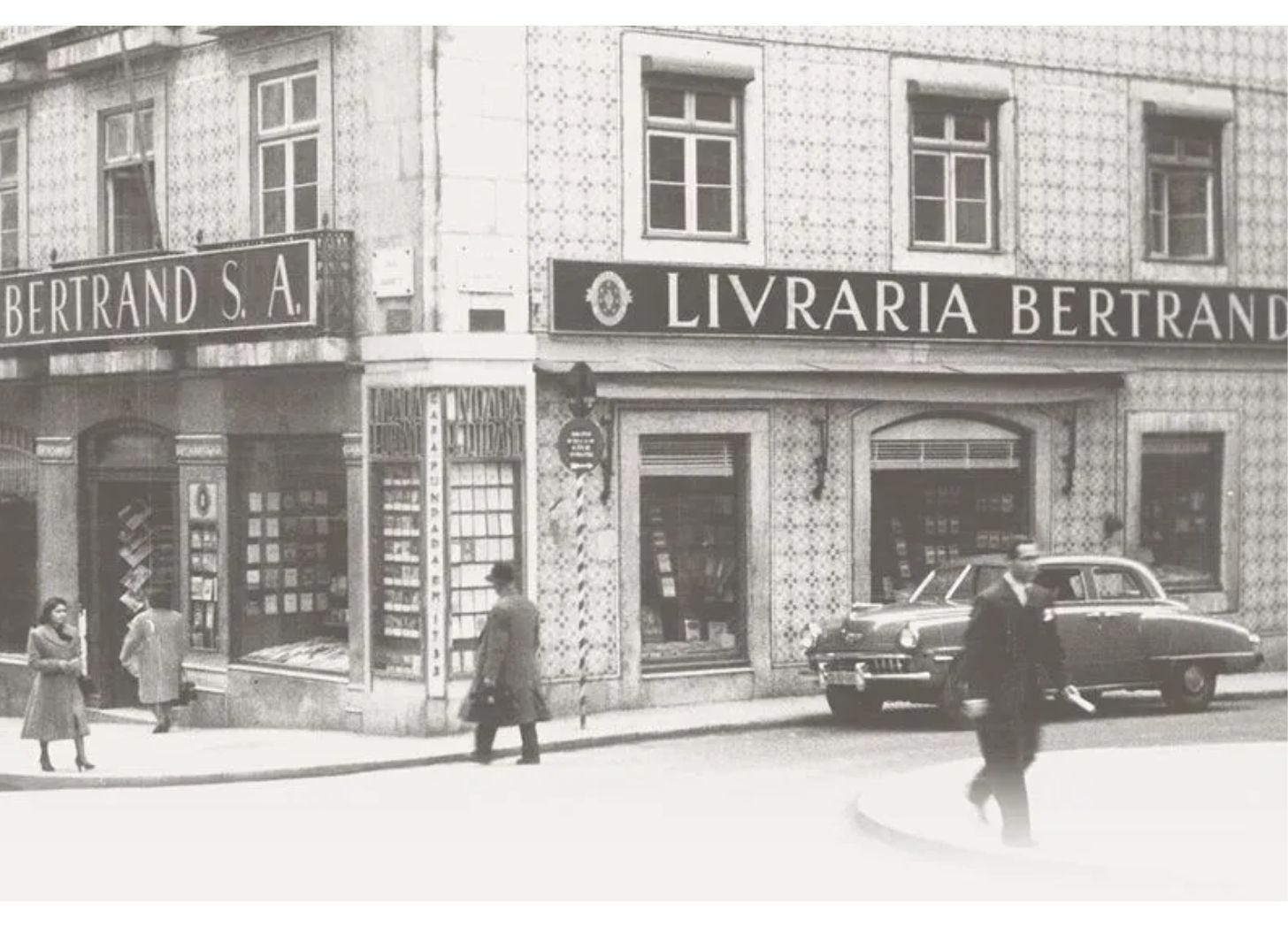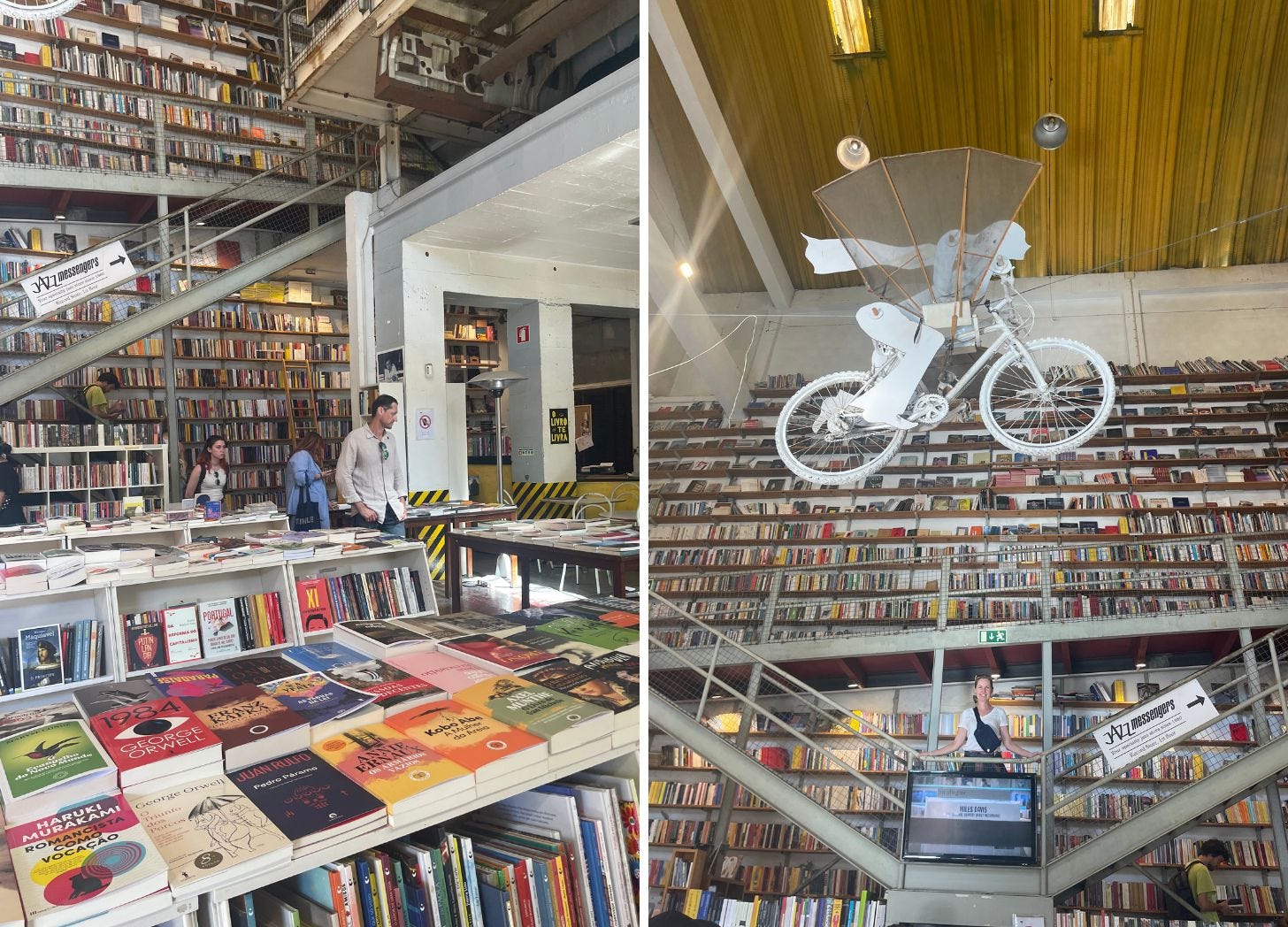The Oldest (and the Coolest) Two Bookstores in Portugal
Plus, how bookshops build identity.
Whenever I get to a new place, the first thing on my agenda is to visit nearby bookshops. I think all book people are like this since it’s the fastest way to connect to a new city or country. If you find fellow readers, you’ll always have something in common.
In London, I rushed to Daunt Books. In Paris, it was The Red Wheelbarrow. I fell in love with Skylight Bookstore in the Los Feliz section of Los Angeles; there’s a tree inside the shop! In Santorini, I fell hard for Atlantis Books, ducking into the cave-like structure to purchase a blank notebook years ago.
It went without saying that on the third day of our trip to Portugal I would drag my family up the steep tiled streets of Lisbon’s Rua Garrett to visit Livraria Bertrand. The shop is the oldest bookstore in the world, as confirmed by the Guiness Book of World Records. It was opened by two French brothers in 1732. Occupying a beautiful, blue-tiled corner building in the busy Chiado neighborhood, the shop is just near the iconic Café A Brasileira where Lisbon’s intellectual elite were once known to sip espressos; now it’s a tourist hotspot.
Something about Livraria Bertrand reminded me of Waterstones in London except the building is remarkable; it’s like walking through a fine museum. Several vaulted rooms stretch tunnel-like through various sections to the children’s room at the far back. Ornate floor-to-ceiling wooden shelves house thousands of titles. It was fun to imagine the same bookstore in the 1700s, the books lined up with golden typeface and thick leather bindings; although most books in the 18th century were made with cheap thin cardboard covers.
It was enchanting, and yet something was missing. It’s not an English-language bookstore, as it shouldn’t be, so most of the books were in Portuguese. I could see the familiar artwork of Ann Neopolitano’s Hello Beautiful and Zadie Smith’s The Fraud on the shelf, but I couldn’t read a single word on the cover. Even when I went to the small English language section, spotting a few Emily Henry novels, I was jarred. The American authors felt out of place, like interlopers in this unfamiliar country.
It hit me then that bookstores are so much more than a place to sell books. They’re about community and bringing people together. I left feeling disappointed, less connected to Lisbon and its residents than I felt before I went in. Isn’t that amazing though? That I felt disconnected? The internet has given us all the sense that you should be able to go anywhere in the world and feel at home. But language is still a barrier that separates us. If I wanted to fit into this bookshop, I needed to respect the patrons and their language and learn it.
Dua linga here I come. :)
The next day we went for a bike ride along the river to the stunning old tower in Belem, and on the way home, we made a pit stop at the LX Factory, the creative heartbeat of sunny and lively Lisbon. Think: quirky shops, a flower stand housed in a vintage truck, street side cafes and a giant artisan market on Sundays where you can peruse resin-printed earrings and artwork made with French comics. We came for the market — and the LER DEVAGAR bookstore, which has become famous, in part, because of the Instagram set snapping photos of its iconic hanging bicycle sculpture. My kids rushed to the children’s section, little of it in English, and perused through the Diary of a Wimpy Kid series in Portuguese. According to the bookseller, Jeff Kinney’s goofy graphic novels are as beloved by Portuguese kids as American ones. Somehow this didn’t surprise me.
I strolled along the skinny shelf of titles in English, which felt like an afterthought in the bookshop — because few English speakers buy books here, of course. As I grazed my hands along the covers, something I often do while looking at books, I didn’t feel inspired to buy anything. Which was just so strange for me, because I pretty much buy novels wherever I go.
It made me think about how the perception of books influences the books we actually want to read. The cover, the typeface, how it makes us feel, how the bookshop makes us feel when we see the book. If there’s a stack of novels, we’re picking up something important. If there’s a signed copy, we know the author touched its pages. Every new release I purchase feels like another gem in a necklace I’m collecting bead-by-bead. Bookstores dazzle us with artwork and colors and the mere joy of knowing that there are so many thoughts and lives and ideas beating in the books laid out before us. My heart always skips, too, when I find a title I want to read. You know the feeling I’m talking about.
The bookshop was fun to visit, but I left wishing that I’d felt more in its stacks. It was then that I realized why I go to bookstores at all. Standing in the aisles always reaffirms who I am, my place in the world, and who I want to be. In a bookstore, I’m a writer. I’m a thinker. I’m a seeker of knowledge and a dreamer. I’m a creative, an intellectual. That is why I return to these shops again and again. To lift up book after book and read the endless cover flaps and remind myself why I choose to do this job.
And then there’s the magic. The moment when a book calls out to you, when you realize you’ve found your perfect match. When you carry the novel up to the counter and feel a sense of pride at your purchase. Books find you, they get us to ask the hard questions, and they always make us feel at home.
But you don’t feel any of that when you cannot read the words.
Now that I’m home typing this in my kitchen, I feel a bit more affinity for these bookshops in Lisbon. But the truth is: It’s okay that I didn’t connect to these shops. I’m not supposed to. My community is here right now. In all of the many bookstores where I feel like myself.
We did not visit the northern city of Porto where the most famous (read: STUNNING) bookstore Livraria Lello is located. This bookshop was allegedly the inspiration for J.K. Rowling’s library in the Harry Potter series since Rowling lived in Porto while writing the novel; Rowling has said she’s never been to the bookshop. (huh?) Anyway, my friend was traveling to Porto and said to enter the bookshop they force you to pre-buy a book as your ticket, which makes sense. Otherwise the social media crowd would simply sail in and out all day long without buying a thing. There are only two book choices to get your ticket, too: Romeo and Juliet or The Art of War.








I’ve been to Portugal several times (my husband is Brazilian and having a native Portuguese speaker is a big plus)! The bookstore in Porto is nothing but magical. I haven’t been to any bookstores in Lisbon, but I love going to anything bookish when we travel abroad. This summer - Sweden & Norway. I need to do some research about their literary scene!
nice!